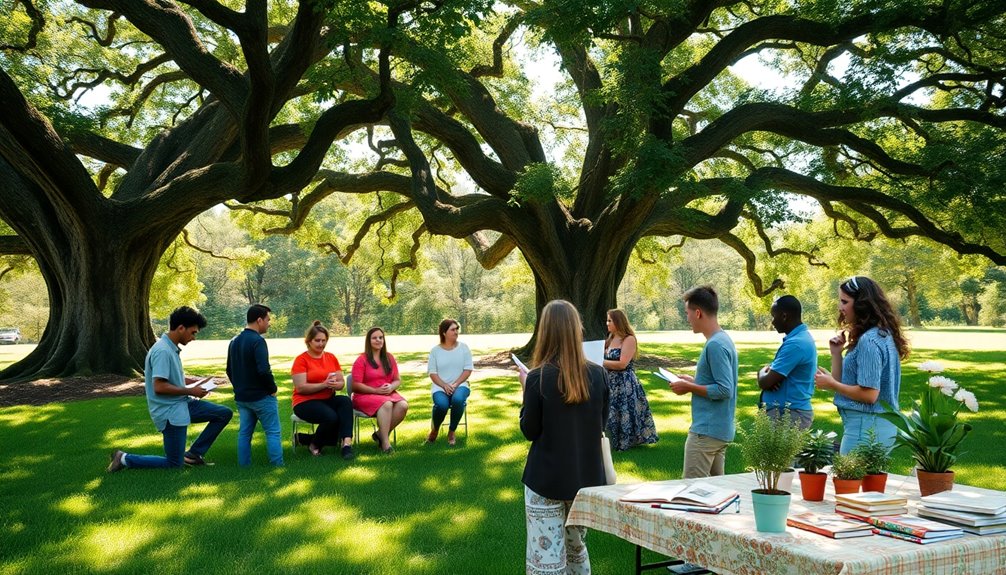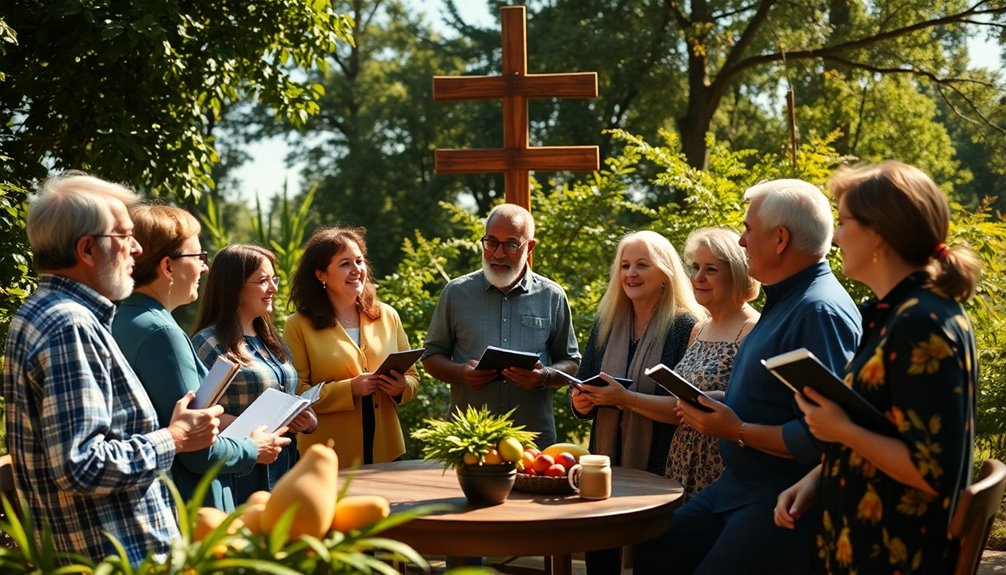Planning a church leadership retreat that inspires and leads with purpose starts with innovative activities. Create vision boards to visualize aspirations and engage in team-building exercises to strengthen relationships. Include interactive workshops focusing on emotional intelligence and conflict resolution. Don't forget personal reflection journals for leaders to articulate their journeys. A structured agenda balancing sessions and downtime ensures everyone feels rejuvenated. This retreat should also align with your church's mission, fostering cohesion among leaders. If you want to explore more ideas and strategies to enhance your retreat experience, there's plenty more to discover.
Key Takeaways
- Organize vision board sessions to visually align leadership goals and aspirations for the church community.
- Implement team-building exercises, such as ropes courses, to enhance collaboration and strengthen relationships among leaders.
- Schedule interactive workshops focusing on emotional intelligence and conflict resolution to empower leaders in their roles.
- Create small group sharing sessions for intimate discussions that foster deeper connections and personal growth.
- Incorporate personal reflection journals to encourage leaders to articulate their faith journeys and leadership experiences.
Innovative Retreat Activities

When planning your church leadership retreat, consider incorporating innovative activities that not only engage participants but also foster personal and collective growth.
Start by creating vision boards to visually represent your church's aspirations, using magazines and poster boards to encourage creativity.
Implement team-building exercises like ropes courses or scavenger hunts to strengthen relationships among leaders.
Organize interactive workshops featuring guest speakers on emotional intelligence and conflict resolution, equipping participants with essential leadership skills.
Facilitate small group sharing sessions for intimate discussions, promoting deeper connections and understanding.
Finally, provide journals for personal reflection, allowing leaders to articulate their faith and leadership journeys, enhancing both individual growth and spiritual renewal throughout the retreat activities.
Benefits of Leadership Retreats

Leadership retreats offer numerous benefits that can significantly impact both individual leaders and the church as a whole.
You'll find that these gatherings provide dedicated time for spiritual renewal, helping to combat burnout and deepen your relationship with God. As your leadership team grows closer, you'll strengthen relational bonds essential for effective ministry and future collaboration.
Skill development workshops enhance your personal and professional growth, focusing on crucial areas like communication and emotional intelligence.
Moreover, retreats create opportunities for self-reflection, allowing you to evaluate strengths and weaknesses. By facilitating group discussions and prayer, leadership retreats help you align on the church's mission, ultimately fostering cohesion and direction that makes a positive impact on your community.
Essential Components of Retreats

To create a successful church leadership retreat, it's crucial to incorporate essential components that foster connection and growth among participants.
Start by selecting a retreat center or serene outdoor location that enhances the overall experience. Establish a theme that aligns with current challenges faced by church leaders, ensuring relevance.
Include structured sessions, downtime for relaxation, and personal sharing to build stronger relationships. Engage participants with activities like vision boards and team-building exercises, which promote professional development and collaboration.
Finally, set clear objectives and conduct post-retreat evaluations to measure success and identify areas for improvement.
Empowering Continuous Learning

Empowering continuous learning is vital for church leaders who want to adapt to the ever-changing dynamics of their congregations.
By implementing ongoing education programs, you can enhance your leadership skills through workshops, webinars, and conferences tailored to pressing church leadership topics.
Embrace mentorship opportunities within your church; this allows experienced leaders to share valuable insights with emerging leaders, strengthening your leadership pipeline.
Regular feedback sessions after retreats can help you pinpoint areas for improvement, motivating you to pursue further education and training in specific competencies.
Additionally, encourage participation in online courses and resources to stay updated on best practices and innovative approaches.
This commitment to continuous learning will ultimately elevate your effectiveness as a leader.
Planning and Logistics

After investing time in continuous learning, it's important to turn your focus to the logistics of planning a successful church leadership retreat.
Start by selecting a comfortable venue that fosters relaxation and productive discussions, like a specialized camp or retreat center.
Next, create a detailed agenda that balances structured activities with downtime, ensuring you maximize meaningful engagement and spontaneous interactions.
Be mindful of scheduling the retreat at a time that accommodates everyone's availability while considering local weather conditions.
Finally, incorporate a post-retreat evaluation process to gather feedback from participants, helping you assess the retreat's effectiveness and inform future planning.
If you're opting for a virtual retreat, choose reliable digital tools to maintain engagement and connection during your time together.
Reconnecting Post-Pandemic

As church leaders gather for retreats in the wake of the pandemic, they're presented with a vital opportunity to rebuild connections and restore community. Reconnecting with one another is crucial after the isolation many experienced.
By carving out time to spend together, you can foster a culture of open dialogue and reflection. Off-site leadership retreats can create a relaxed atmosphere, allowing leaders to assess the needs of the congregation and strategize future initiatives.
Prioritizing shared experiences and prayer during these retreats strengthens spiritual resilience, helping everyone process the emotional toll of recent events.
Ultimately, these moments together pave the way for renewed commitment to your mission and vision, ensuring your community thrives moving forward.
Effective Staff Retreat Ideas

When planning an effective staff retreat, it's essential to blend relaxation with purpose to foster strong connections among your team. Incorporate leisure activities like campfire singing or talent shows to boost morale and encourage camaraderie.
Balance these fun moments with structured sharing and prayer sessions, allowing team members to connect personally and build trust. Don't forget to include downtime for casual conversations, as this helps mitigate stress and rejuvenate your staff.
Additionally, engage your team in creative problem-solving challenges that inspire innovative thinking and actionable solutions to ministry issues.
Sample Retreat Agenda

Creating a sample retreat agenda is crucial for ensuring that your church leadership retreat is both productive and enjoyable.
Start each day with morning devotionals, allowing your leaders to reflect on Scripture and set a spiritual tone. Allocate time wisely for strategic planning discussions, ensuring everyone aligns on organizational goals and vision.
Incorporate team-building activities and icebreakers to strengthen relationships and enhance open communication among participants. Balance structured sessions with ample downtime for recreation and relaxation, fostering a supportive environment.
Evenings can be filled with informal gatherings, like campfire discussions or talent showcases, encouraging connection and creativity.
Long-term Investment in Leadership

Investing in church leadership over the long term is essential for fostering a thriving ministry. It takes time and hard work, but the rewards are invaluable.
By focusing on individual leaders and their development, you create a foundation for effective collaboration and conflict resolution. Leadership retreats play a crucial role in this long-term investment, equipping leaders with emotional intelligence and organizational skills necessary for today's challenges.
The impact of these retreats extends beyond immediate benefits; consistent engagement leads to increased resilience and prepares leaders for unforeseen circumstances.
Moreover, prioritizing mentorship for younger leaders ensures a sustainable leadership pipeline, ultimately enhancing your church's internal culture and mission fulfillment.
This commitment to development cultivates a vibrant, engaged congregation ready to thrive.
Frequently Asked Questions
How Do You Structure a Leadership Retreat?
To structure a leadership retreat, start by outlining a clear agenda that defines your objectives and activities.
Mix structured sessions, like workshops, with unstructured time for reflection and bonding.
Schedule collaborative activities, such as brainstorming and small group discussions, to foster open dialogue.
Incorporate moments for spiritual practices, like prayer, to keep everyone aligned with the mission.
Finally, wrap up with a debriefing session to gather feedback and set future goals.
What Makes a Good Church Retreat?
Imagine a garden, where each leader is a unique flower. To flourish, you need sunlight, water, and space to grow.
A good church retreat acts as that nurturing environment. It offers time for prayer and reflection, fostering spiritual renewal. Engaging activities strengthen bonds among you, while tailored themes address your specific challenges.
Workshops provide essential skills, and post-retreat evaluations ensure you're continually blossoming, ready to serve your community with renewed purpose.
How Do You Encourage Leadership in the Church?
To encourage leadership in the church, you can provide workshops that enhance skills like communication and conflict resolution.
Foster mentorship by pairing experienced leaders with those who are newer to guide their growth.
Organize retreats that focus on spiritual renewal and team bonding, helping leaders connect and recharge. Participants will engage in a variety of engaging and transformative activities designed to foster deeper connections and personal growth. Incorporating christian men’s retreat activities such as group discussions, prayer sessions, and outdoor challenges, these retreats create a supportive environment for sharing experiences and building lasting friendships. By the end of the retreat, leaders will leave feeling rejuvenated and inspired to lead with renewed purpose and commitment.
Promote open dialogue for transparency and implement accountability structures to keep everyone aligned with the church's mission and goals.
What Do You Talk About at a Leadership Retreat?
At a leadership retreat, you'll discuss both challenges and successes, creating a balanced conversation.
You'll dive into your church's mission and vision, aligning your goals with community needs.
Emotional intelligence and conflict resolution topics will enhance your interpersonal skills, while strategic planning sessions will help you identify strengths and weaknesses.
Don't forget to carve out time for personal reflection and prayer; it's essential for reconnecting with your faith and recharging your leadership spirit.
Conclusion
As you embark on your church leadership retreat, imagine a vibrant tapestry woven from shared experiences, insights, and renewed purpose. By embracing innovative activities and empowering continuous learning, you'll not only strengthen bonds but also ignite a passion for growth within your team. Remember, investing in leadership today shapes the future of your community. So, take that leap—create an inspiring retreat that fosters connection and vision, and watch your church flourish like never before.









